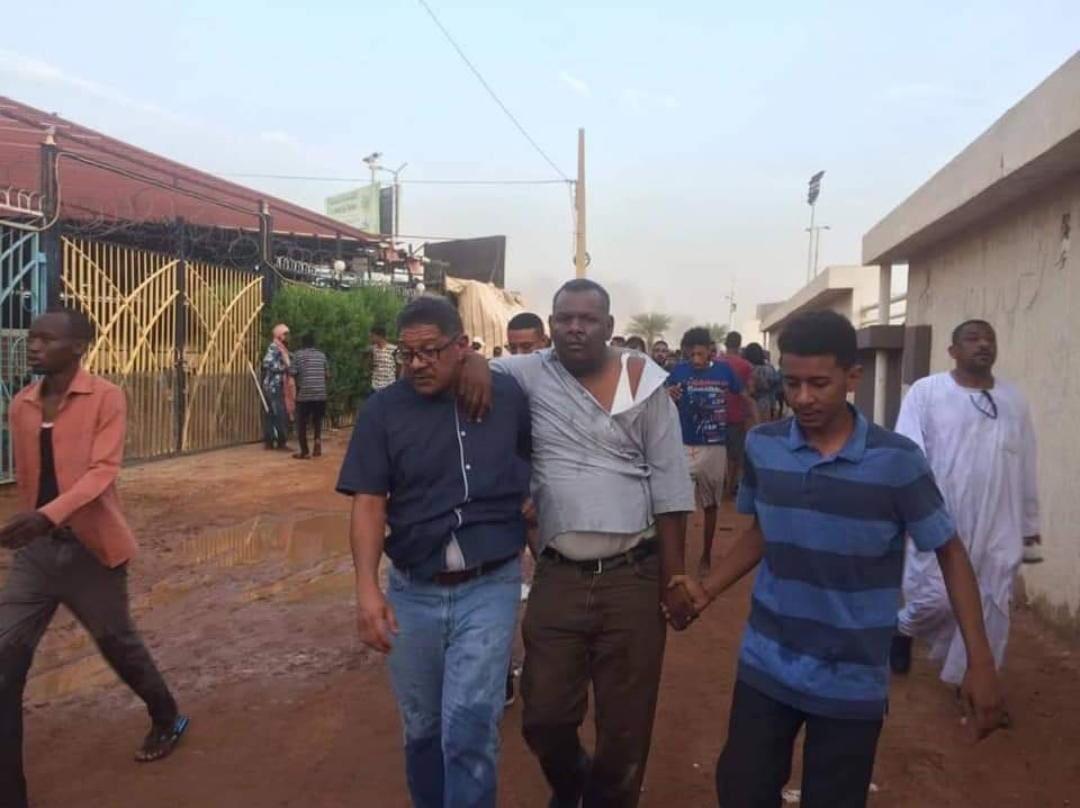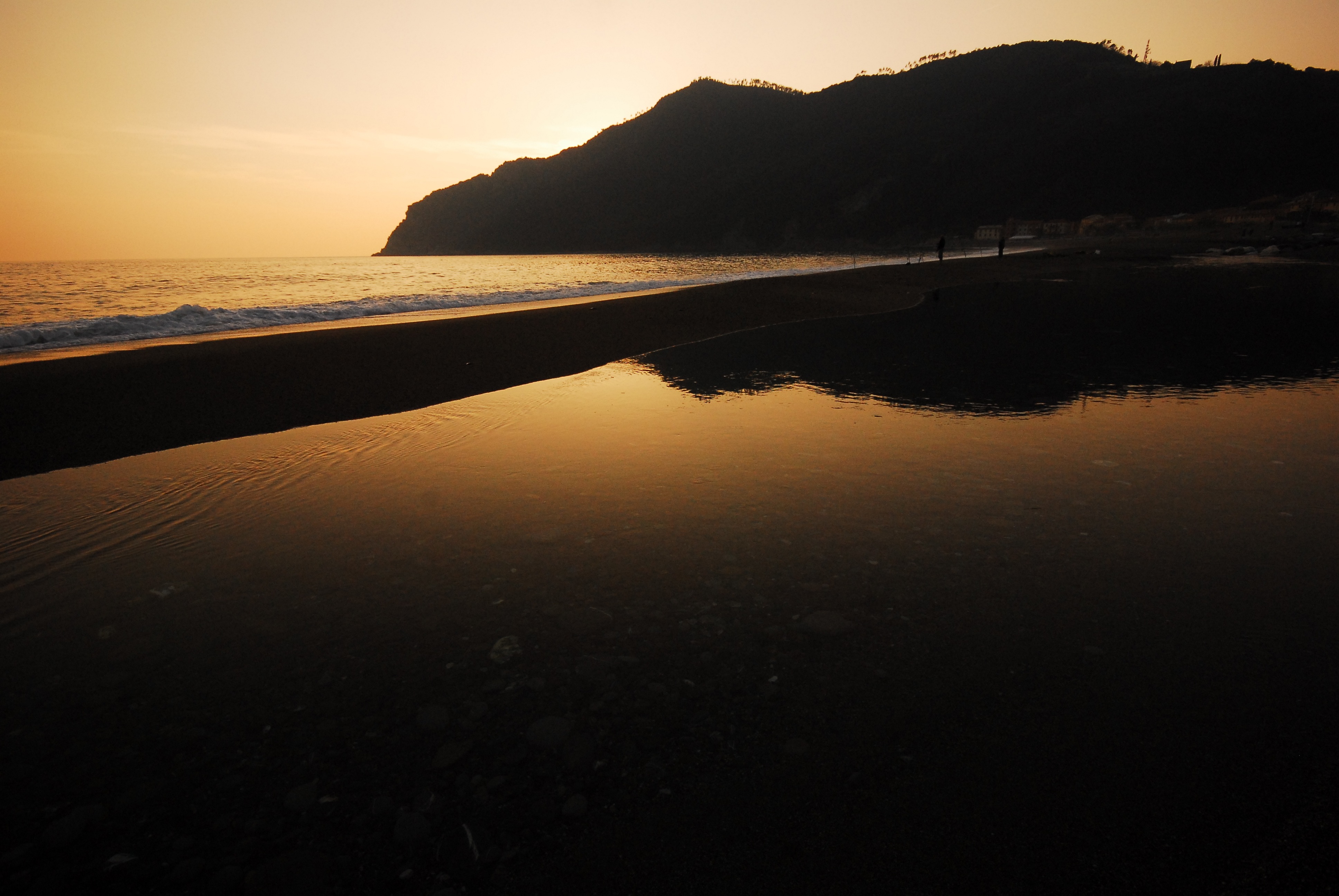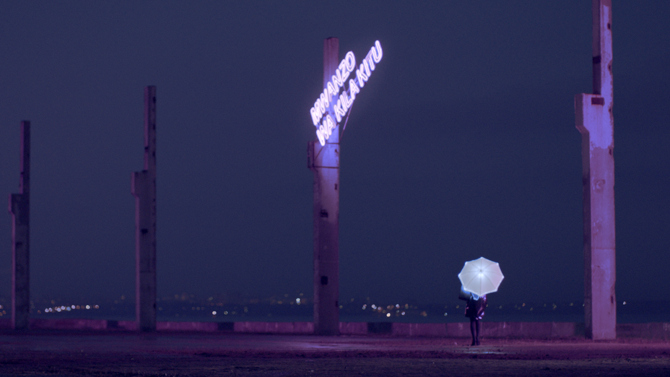Cosa sta succedendo in Sudan – Parte 2
Non è facile fare il punto della situazione sul Sudan. Ci abbiamo provato i giorni scorsi cercando di ricostruire i vari passaggi che hanno portato all’attuale status di incertezza e transizione, ma la verità è che stiamo parlando di un paese nel quale ogni giorno anche il più semplice sussurro può trasformarsi in un impeto di rivolta. Per provare a capire in tempo reale cosa sta succedendo in questi giorni, sono entrato in contatto con una studentessa di medicina sudanese, May, che mi ha continuamente aggiornato durante tutta la prima metà di giugno sull’evolversi delle vicende.
Ciao, mi chiamo May, ho ventun anni e sono un’aspirante dottoressa. Non sono un’attivista, né appartengo a una qualche organizzazione. Sono solo una normale cittadina sudanese che spera di veder fiorire il proprio paese come del resto qualsiasi altro paese. Mandami pure le tue domande per adesso e cercherò di risponderti appena ho una minima possibilità (se i problemi di internet si stabilizzano un poco).
Parlare con May, ammesso che una chat WhatsApp possa definirsi “parlare”, è alquanto strano. So bene che sono in contatto con un’abitante di un paese che sta passando un inferno di sangue e fuoco, ma ciò che mi colpisce di lei fin dai primi momenti è la sua cortesia. A dire il vero la nostra conversazione non è iniziata con la presentazione di intervistatore e intervistato bensì la sera del 5 giugno. Leonardo, uno studente di medicina dell’Università di Pavia passa, su mia richiesta, il mio numero a May e dieci minuti dopo sono raggiunto da notifiche di un numero straniero. La prima vera presentazione è quindi molto più spiccia e sbrigativa, ma la gentilezza di May è roboante fin da subito: “sono felice che tu voglia scrivere della situazione in Sudan”. Un minuto dopo mi invia un dattiloscritto, con ogni probabilità lo stesso preimpostato per chiunque glielo chieda, nel quale riassume dettagliatamente la storia recente del suo paese fino ad oggi. Nomi sconosciuti come “Omar- Al Bashir” e “Janjaweed” mi si palesano davanti agli occhi, ricordandomi che la storia non si fa solo con gli eventi ma con i nomi e le parole specifiche di ogni tempo e luogo.
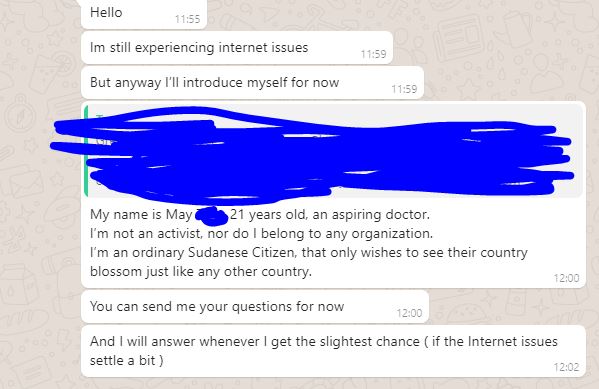
La mattina presto del 3 giugno, il giorno prima dell’Eid Alfatir, una lungamente attesa occasione per la quale i manifestanti pacifici si sono preparati settimane prima, è avvenuto un micidiale massacro durante il sit-in, colpi di arma da fuoco sono stati sparati dalle “Forze di Supporto Rapido” una forza paramilitare pesantemente armata dall’ex presidente. I manifestanti pacifici sono stati trattati in modo violento, i bambini e le donne sono stati violentati, altri picchiati a morte e le tende dove i manifestanti dormivano sono state bruciate senza pietà. In effetti, l’intera nazione ha sofferto in maniera indelebile quella mattina. Fino a questo momento le Forze di Supporto Rapido, chiamate appunto “Janjaweed” continuano a commettere atrocità in tutto il paese.
Le RSF (Rapid Support Forces) o “Janjaweed” come le chiama May, ritornano spesso nei suoi messaggi. Decido di informarmi anche presso altre fonti e scopro che i Janjaweed (letteralmente “demoni a cavallo”) altro non sono che l’ennesima milizia di stampo musulmano integralista nata in seno all’ennesimo conflitto subsahariano, per la precisione nel 2003 durante la guerra del Darfur. Non deve stupire che loro preferiscano farsi chiamare Mujaheddin ovvero Jihadisti. Essi sono responsabili di ogni sorta di atrocità dal 2003 a oggi e sono i principali responsabili materiali delle carneficine di inizio giugno.
Le RSF entrano in città
È il 13 giugno quando May mi scrive per dirmi che la disobbedienza civile è praticamente finita, per volontà degli stessi che l’hanno iniziata, l’SPA (Sudanese Professionals Association), la più importante rete di sindacati a livello nazionale.
Soprattutto perché c’è una percentuale della popolazione sudanese che trae il proprio pane dal lavoro quotidiano e non sono in grado di proseguire la disobbedienza civile per più di due giorni.
Ma non solo la povera gente. May continua:
Alcune persone (in particolare i grandi “capoccia” delle banche e delle grandi aziende … ecc.) sono state minacciate nelle loro case delle Forze di Supporto Rapido affinché proseguissero normalmente con il loro lavoro.
Chiedo a May, quasi ingenuamente ma sinceramente interessato, cosa pensa che avverrà nell’immediato futuro e se spera in un intervento delle Nazioni Unite
Francamente, non siamo molto ottimisti sull’intervento delle Nazioni Unite, specialmente dopo che Cina e Russia hanno bloccato l’azione delle Nazioni Unite in Sudan, questo esprime chiaramente la vastità dei loro interessi in Sudan e su come un governo a guida civile non opererebbe a loro favore.
Come riporta SudanRise infatti, Russia e Sudan sono legati ormai da tempo da un’alleanza forte. Per la Russia il Sudan è un importante alleato globale nel continente africano, viceversa il Sudan vede nella Russia il più importante alleato negli investimenti economici in Europa. Inoltre, anche dopo l’embargo delle Nazioni Unite nel 2005, la Russia ha continuato a esportare armi in Sudan, quelle armi che i Janjaweed usano tutt’ora. Inoltre, la Russia punta ad avere un accesso strategico nel Mar Rosso, senza considerare le riserve aurifere scoperte dalla compagnia, sempre russa, M-Invest.
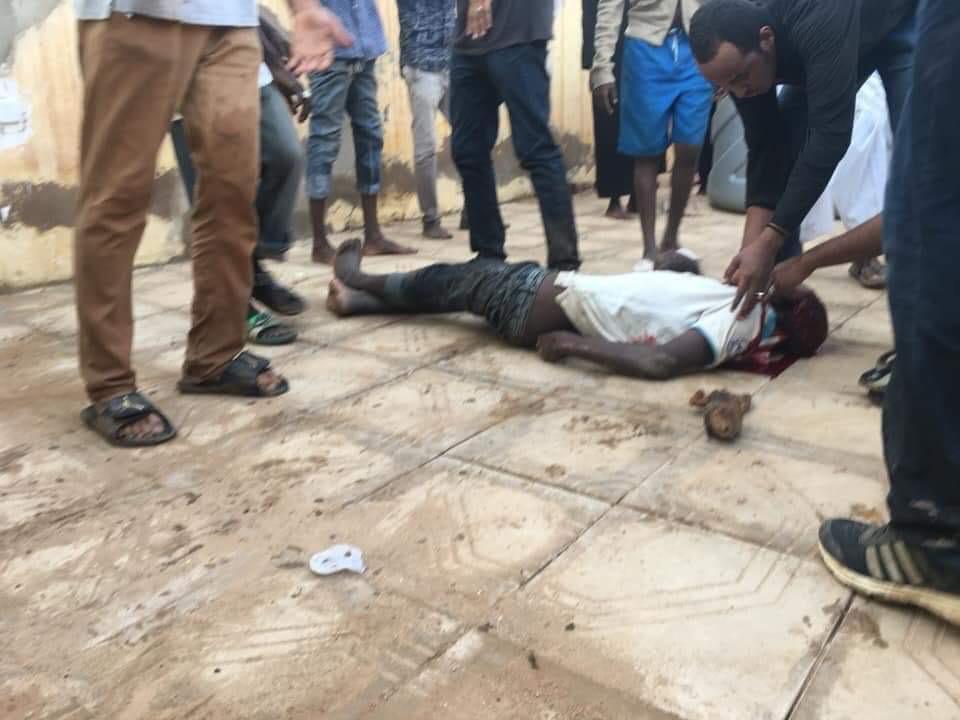
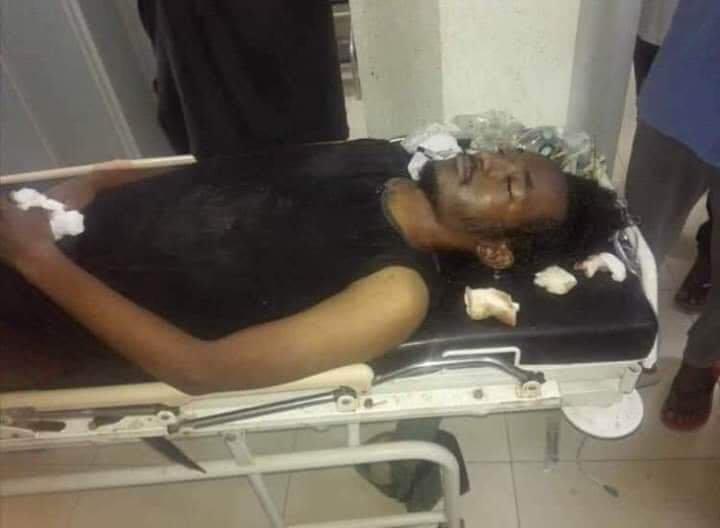
Ad oggi la situazione si è un poco calmata ma è tutt’altro che risolta. Una sera scrivo a May, semplicemente per chiederle come stia dopo aver sentito di nuove violenze nelle principali città. Mi risponde che lei vive vicino alle ambasciate e che quindi si tratta di una zona relativamente sicura, ma anche a lei capita di sentire a volte spari in lontananza. Sempre con quella punta di ingenuità che contraddistingue chiunque non tocchi con mano certe situazioni, le dico di “stare attenta”. Invece, come un monito che giunga a tutti quelli che per il semplice fatto che non toccano determinate situazioni con mano, pensano di potersi non curare di problemi apparentemente tanto lontani dai nostri, diciamo “state attenti”. State attenti al Sudan e al sangue che viene versato ogni giorno dai grandi scacchisti internazionali sulla pelle dei fratelli sudanesi. Poiché un giorno quei fratelli potrebbero voler scappare dal loro paese, risalire il continente, imbarcarsi su un mezzo di fortuna e arrivare alle nostre coste sperando in un briciolo di umanità dall’altra parte del mondo, solo per poi sentirsi dire “Ma perché? C’è la guerra in Sudan?”.
Desidero ringraziare Cinzia Orlando e Leonardo Gerosa per la preziosa collaborazione, senza la quale questi due articoli non sarebbero stati possibili.
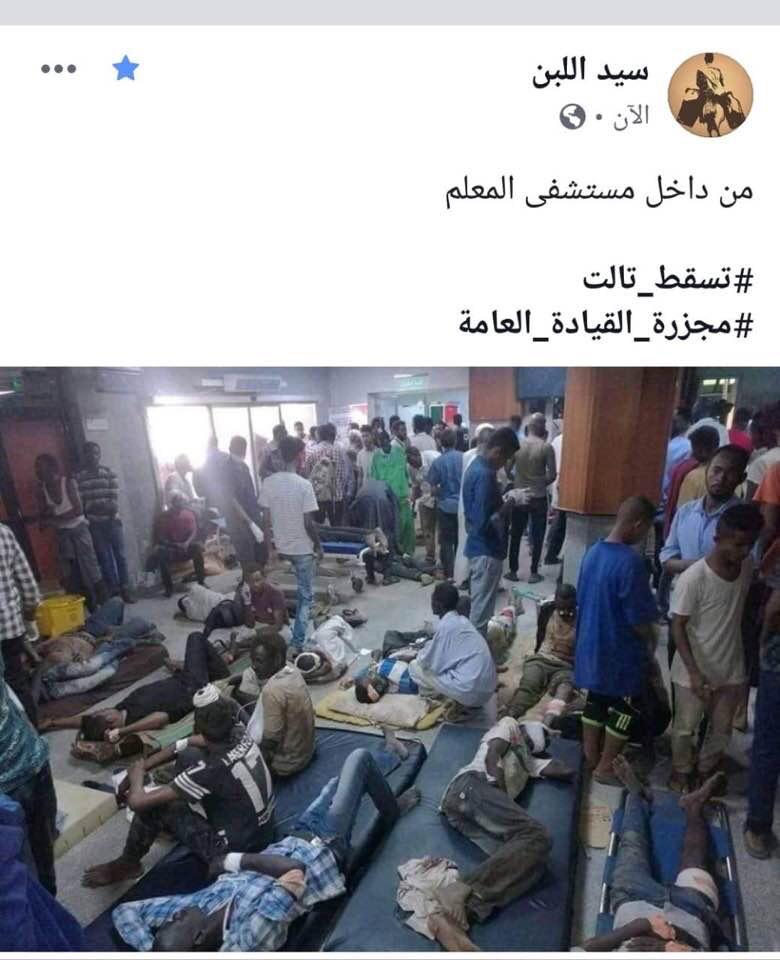
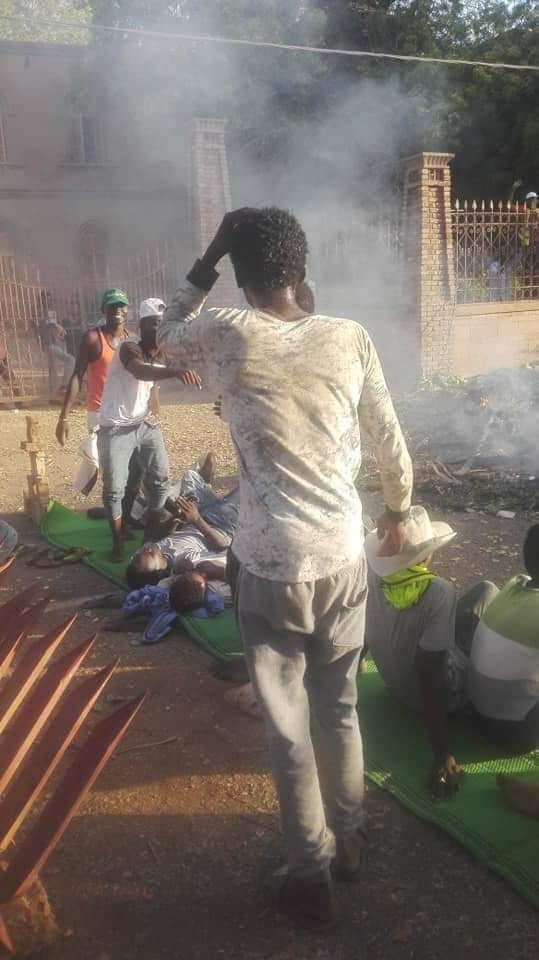
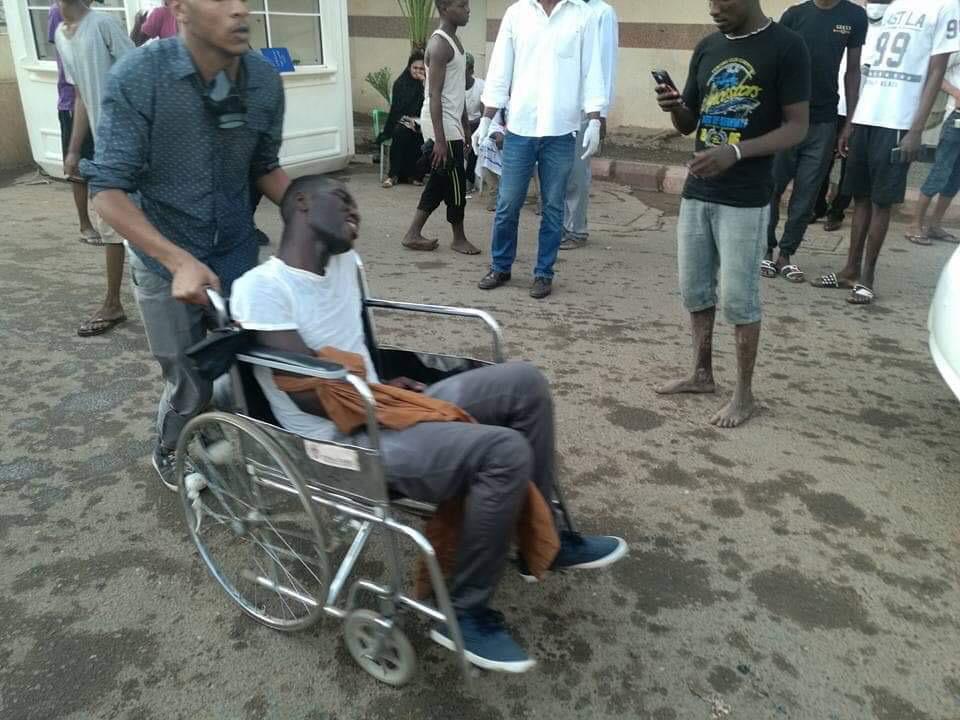
English Version
What’s going on in Sudan – Part 2
It’s not easy to take stock of the situation in Sudan. We tried in the last few days to reconstruct the various steps that led to the current status of uncertainty and transition, but the truth is that we are talking about a country in which every day even the simplest whisper can turn into a surge of revolt. In order to figure out in real time what is happening these days, I came into contact with a Sudanese medicine student, May, who continually updated me throughout the first half of June on the evolution of the events.
My name is May Tarig 21 years old, an aspiring doctor. I’m not an activist, nor do I belong to any organization. I’m an ordinary Sudanese Citizen, that only wishes to see their country blossom just like any other country.
Talking to May, assuming a WhatsApp chat can be defined “talking”, is kind of weird. I know well that I’m in contact with a resident of a country that is going through a hell of blood and fire, but what stroke me about her, from the very first moments, was her courtesy. Actually, our conversation didn’t start with the presentation of interviewer and interviewed, but on the evening of June 5th. Leonardo, a medical student from the University of Pavia passed, on my request, my cell number to May and ten minutes later I receive push notifications from a foreign number. The first real presentation is therefore much brisker and hastier, but May’s kindness is bombastic right away: I’m glad you’re willing to write about the situation in Sudan. A minute later she sends me a typescript, probably the same preset for anyone who asks her, in which she summarizes the recent history of her country to these days. Unknown names like “Omar-Al Bashir” and “Janjaweed” appear before my eyes, reminding me that history is not only made with events but with the specific names and words of each time and place.
In the early morning of June 3rd, the day preceding Eid Alfatir, a long awaited occasion for which the peaceful protesters prepared for weeks before, a deadly massacre took place at the sit-in site, sporadic heavy gunfire was fired from the Rapid support forces which is a paramilitary force that was heavily armed by the former president. Peaceful protesters were dealt with in a savagely violent way, children and women were raped, others beaten to death and tents where the protesters were sleeping in were unsparingly burned. Indeed, the whole nation experienced indelible pain that morning. Till this moment the rapid support forces, precisely named as “Janjaweed” continue to commit atrocities in all quarters of the country.
The RSF (Rapid Support Forces) or “Janjaweed” as May calls them, are recurrent in her messages. I decide to inform myself also at other sources and I discover that the Janjaweed (literally “demons on horseback”) are nothing but the umpteenth militia of fundamentalist muslims born within the umpteenth sub-Saharan conflict, to be precise in 2003 during the war of Darfur. It is not surprising that they prefer to call themselves Mujaheddin or Jihadists. They are responsible for all sorts of atrocities from 2003 to the present day and they are the main material perpetrators of the carnage in early June.
It is June 13th when May writes me to tell me that civil disobedience is practically over, by the will of the same people who started it, the SPA (Sudanese Professionals Association), the most important network of trade unions at national level.
Especially because there is a percentage of the sudanese people who get their bread from day to day work so they weren’t able to commence with the civil disobedience for more than two days
But not just poor people. May continues:
Some people (especially the big heads in banks, big companies…etc) were threatened at their houses to get on with work normally by the rapid support forces
I ask May, almost naively but sincerely interested, what he thinks it will happen in the immediate future and if she hopes for a UN intervention.
To be honest, we’re not very optimistic about the UN intervention, especially after China and Russia blocked UN action in Sudan, this speaks volumes about their vested interests in Sudan and how a civilian-led government wouldn’t operate in their favor
As reported by SudanRise, in fact, Russia and Sudan have long been linked to a strong alliance. For Russia, Sudan is an important global ally on the African continent, while Sudan sees Russia as the most important ally in economic investments in Europe. Furthermore, even after the UN embargo in 2005, Russia has continued to export weapons to Sudan, those weapons that the Janjaweed are still using. Furthermore, Russia aims to have a strategic access to the Red Sea, this without considering the gold reserves recently discovered by the company, once again Russian, M-Invest.
To date the situation has calmed down a little but it is far from being resolved. One evening I wrote May, simply to ask her how she is after hearing about new violence in major cities. She replies that she lives near the embassies and that it is therefore a relatively safe area, but she also happens to hear gunfire in the distance. Always with that bit of ingenuity that distinguishes anyone who does not touch certain situations with their hands, I tell her to “be careful”. Instead, as a warning that reaches all those who, for the simple fact that they do not touch certain situations with their hands, think they cannot care about problems apparently so far from ours, we say “be careful” and watch out for Sudan and the blood that is shed every day by the great international chess players on the skin of the Sudanese brothers. For one day those brothers might want to escape from their country, go up the continent, embark on a makeshift boat and reach our shores hoping for a bit of humanity on the other side of the world, only to be told “But why? Is there a war in Sudan? “
I would like to thank Cinzia Orlando and Leonardo Gerosa for their precious collaboration, without which these two articles would not have been possible.

